Whether Lent has been for you a time of true spiritual renewal, or maybe instead a time of trying and failing to come closer to the Lord, Holy Week gives all of us the opportunity to start again. Though Palm Sunday begins full of hope and joy, each successive weekday brings increasing pain. As we journey with the Lord through that pain, we try to look beyond it to find confidence, trust, acceptance, and ultimately hope, even in the silence of Good Friday and Holy Saturday.
May the time you spend in the company of the Lord this Holy Week enable you to experience this movement from the pain of his Passion to the hope of his Resurrection.
‘Holy Week is a journey that starts in hope; is humbled and challenged by Jesus’ teaching and example; is shattered by fear and betrayal; is overwhelmed by grief and finally rejoices in new possibilities . . . Holy Week is the reflection of life that takes us beyond pain into the hope of the Resurrection.’
– Archbishop Linda Nicholls, primate of the Anglican Church of Canada, 2022
www.anglicanjournal.com/holy-week-journeying-beyond-pain-to-hope
 MONDAY: FROM PAIN TO CONFIDENCE
MONDAY: FROM PAIN TO CONFIDENCE
When those who do evil draw near to devour my flesh,
it is they, my enemies and foes, who stumble and fall.
Though an army encamp against me, my heart would not fear.
Though war break out against me, even then would I trust.
Do not abandon or forsake me, O God, my Saviour!
Do not leave me to the will of my foes,
for false witnesses rise up against me,
and they breathe out violence.
Do not abandon or forsake me, O God, my Saviour!
Though father and mother forsake me,
the Lord will receive me.
– Psalm 26 (27)
REFLECTION
As I come to pray on this first day of Holy Week, I reflect on my mood. What am I hoping for? After a few deep breaths, I focus on the Lord’s presence with and within me. I make my plea in my own words: ‘Please, Lord, today let me . . .’
After a few moments, I slowly read the verses of the psalm. Maybe they connect immediately to some episode in my life, past or present. If so, I stay with this for a while. As I bring to mind any painful events, how far can I experience the trust and confidence that the psalmist describes?
Patiently, I wait for the Lord to show me how he is or was present, even if I didn’t cry out for his help at that time. I pause and ponder. Perhaps I am also reminded of the problems and the pain of someone I know. How might I help them? What might I do to increase their confidence in the Lord so they know that God will not forsake them? This might be the time for me to speak to the Lord again, and ask for his help.
Before I conclude my prayer, I remember all those around the world who are in pain because of war or violence, and entrust them to the Lord. As I reflect on my prayer time today, I thank you, Lord, for helping me to go beyond pain to a greater confidence in you.
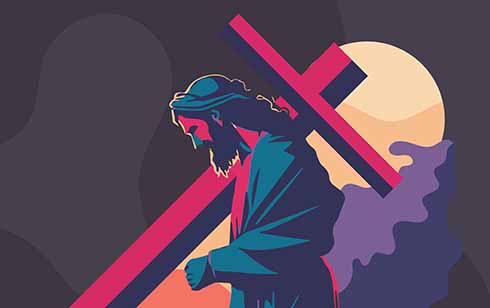 TUESDAY: FROM PAIN TO HOPE AND TRUST
TUESDAY: FROM PAIN TO HOPE AND TRUST
It is for you that I suffer taunts,
that shame has covered my face.
To my own kin I have become an outcast,
a stranger to the children of my mother.
Zeal for your house consumes me,
and taunts against you fall on me.
Taunts have broken my heart; here I am in anguish.
I looked for solace, but there was none;
for consolers – not one could I find.
For food they gave me gall;
in my thirst they gave me vinegar to drink.
As for me in my poverty and pain,
let your salvation, O God, raise me up.
Then I will praise God's name with a song;
I will glorify him with thanksgiving.
The poor when they see it will be glad,
and God-seeking hearts will revive;
for the Lord listens to the needy,
and does not spurn his own in their chains.
– Psalm 68 (69)
REFLECTION
As I come to pray today, I spend a few moments becoming aware of God’s loving gaze on me. In whatever way works best, I relax my body and mind. When I am ready, I turn to the text, and read it slowly a couple of times.
I notice that there are two distinct halves to the psalm. Perhaps my mood, or what is happening in my life now, draws me to one section in particular. Mindful of this, I might ask the Holy Spirit to open my ears and my heart to embrace the whole text. If I find it difficult to relate my own life to the depth of suffering and despair the Psalmist describes, perhaps I can offer this time of prayer for someone else whose life is particularly hard . . . for those around the world persecuted for their faith, or exiled from their homes or families. Or perhaps the Psalmist’s agony seems only all too familiar.
If I’m struggling with pain and hurt, it might help to voice how I feel. I can tell Jesus – one who knows and understands, because of his own suffering. If I’m angry . . . sad . . . disappointed ... maybe I can ask him to show me the way to healing ... to show me the path back to hope and trust?
I turn to the second half of the psalm. What strikes me now? Perhaps I can look back on times where I did find solace and consolation – when I knew the Lord heard me, and my heart was revived. Who or what helped me? I ponder.
As I recall how it felt to be comforted, and to recognise signs of hope despite the difficulties, it may be that I am aware of a sensation somewhere in my body. What words might I use to describe how that feels? As this time draws to a close, a hymn or prayer of praise may come to mind. I sing or recite the words, glorifying the Lord in whom I know I can trust.
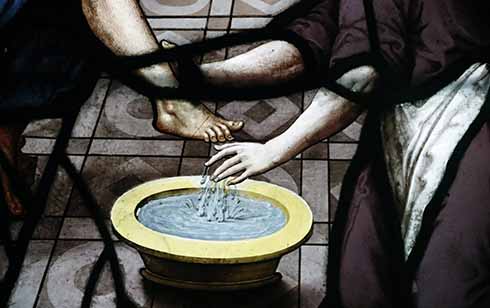 WEDNESDAY: FROM THE PAIN OF BETRAYAL TO ACCEPTANCE
WEDNESDAY: FROM THE PAIN OF BETRAYAL TO ACCEPTANCE
At that time: Jesus was reclining at table with his disciples.
He was troubled in his spirit, and testified,
‘Truly, truly, I say to you, one of you will betray me.’
The disciples looked at one another, uncertain of whom he spoke.
One of his disciples, whom Jesus loved, was reclining at table at the side of Jesus, so Simon Peter motioned to him to ask Jesus of whom he was speaking. So that disciple, leaning back against Jesus, said to him, ‘Lord, who is it?’ Jesus answered, ‘It is he to whom I will give this morsel of bread when I have dipped it.’ So when he had dipped the morsel, he gave it to Judas, the son of Simon Iscariot. Then after he had taken the morsel, Satan entered into him. Jesus said to him, ‘What you are going to do, do quickly.’. . .
When he had gone out, Jesus said, ‘Little children, yet a little while I am with you. You will seek me, and just as I said to the Jews, so now I also say to you, “Where I am going you cannot come.”’
– John 13: 21–28, 33
REFLECTION
For a moment I take note of my surroundings – the sounds, the objects I can see or touch, the smells. Then I gently turn my attention to my body and take time to relax any places where I may be carrying worries or concerns.
I breathe deeply, welcoming God’s loving presence as I let any tension go. I simply notice, acknowledge and hand to God the thoughts and feelings that are with me. In time, I turn to today’s text and read it through slowly. Perhaps I can envisage the place where Jesus and the disciples are gathered. I may even want to settle myself in the scene – watching from a distance, or maybe sitting among the disciples so I can see Jesus more closely.
How do Jesus’s words affect me as he speaks of the betrayal that lies ahead? Perhaps I sense the tension, and feel anxious or perplexed? Perhaps I wonder, with the disciples, about whom Jesus is talking? Is there something I want to say to Jesus?
What do I see in Jesus’s expression as he hands the morsel of bread to Judas, and then sends him away? Perhaps sadness ... disappointment . . . resignation ... acceptance . . . something else?
I let the scene fade and return to my own surroundings. What am I feeling now? Perhaps I’m remembering times in my own life when I’ve betrayed Jesus, making choices that took me away from his presence? Or maybe I’ve felt betrayed by someone else, and still struggle to find it in my heart to forgive them. Perhaps I’m struggling to forgive myself?
Without judgment, I acknowledge these times, and ponder how wonderful it is that the Lord loves and accepts me exactly as I am. In what ways do I need to learn from him? If there is something that remains unresolved . . . perhaps something I’ve hidden away, unacknowledged . . . I can turn to the Lord now, and speak to him from the bottom of my heart. I ask him to show me how to accept the pain of what has happened in my life, as he accepted his pain. ‘Please Lord, help me to move on.’
When I am ready, I draw my prayer to a close and, in my own words, thank the Lord for his presence with me today, and the gift of his merciful love.
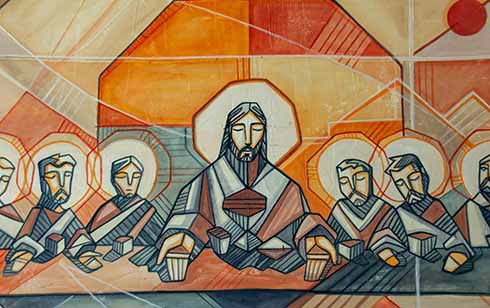 HOLY THURSDAY: FROM PAINFUL ACCEPTANCE TO FUTURE HOPE
HOLY THURSDAY: FROM PAINFUL ACCEPTANCE TO FUTURE HOPE
During supper, when the devil had already put it into the heart of Judas Iscariot, Simon’s son, to betray him, Jesus, knowing that the Father had given all things into his hands, and that he had come from God and was going back to God, rose from supper. He laid aside his outer garments, and taking a towel, tied it round his waist. Then he poured water into a basin and began to wash the disciples’ feet and to wipe them with the towel that was wrapped round him.
When he had washed their feet and put on his outer garments and resumed his place, he said to them, ‘Do you understand what I have done to you? . . . For I have given you an example, that you also should do just as I have done to you.’
– John 13: 2–5, 12, 15
REFLECTION
I take time to become still, and allow myself to be present with the Lord – just as I am. In whatever way works best for me, I bring my body, my mind, my thoughts and feelings to rest. If it helps, I may like to put myself back in touch with yesterday’s prayer. Perhaps something particular has stayed with me?
When I am ready, I direct all my attention to today’s text and let the story unfold, reading the words a number of times. If it helps, I might return to the Upper Room in my imagination. What do I notice?
Assuming the role normally taken by a servant, Jesus kneels before each of his disciples to wash their feet. How do they react? I watch and listen. Jesus kneels now in front of me. How do I feel as he invites me to place my foot in the basin? Am I hesitant? . . . afraid? . . . embarrassed? . . . overwhelmed with emotion? Or is there something else?
If I can, I let him wash my feet. I feel the warmth of the water flowing from the jug, the caress of Jesus’s hands, the texture of the towel. Or if I’m struggling to envisage these moments with the Lord, I may simply want to remain where I’ve settled to pray, and tell him how I’m feeling. What does he say to me?
I hear the invitation to do just as Jesus has done. Knowing everything that was to happen to him, Jesus gives his disciples, and me, his example. He brought hope to so many whose lives he touched. How might he be inviting me to do the same? Where might I be able to bring hope? I ponder.
Perhaps I am overwhelmed by the thought of my own inadequacies and limitations, or fearful of what may be asked of me? If so, I might draw my own hope and encouragement from the words of Saint Mother Teresa: Not all of us can do great things. But we can do small things with great love.
As my time of prayer comes to a close, I ask the Lord in my own words to show me how to do what I can. I pray for the grace to accept what lies ahead with courage, hope and humility.
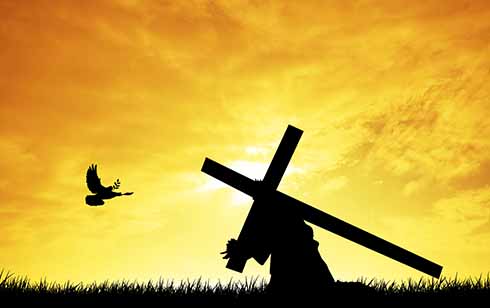 GOOD FRIDAY: PAIN AND SILENCE
GOOD FRIDAY: PAIN AND SILENCE
And about the ninth hour Jesus cried out with a loud voice, saying, ‘Eli, Eli, lama sabachthani?’ that is, ‘My God, my God, why have you forsaken me?’ And some of the bystanders, hearing it, said, ‘This man is calling Elijah.’ And one of them at once ran and took a sponge, filled it with sour wine, and put it on a reed and gave it to him to drink. But the others said, ‘Wait, let us see whether Elijah will come to save him.’ And Jesus cried out again with a loud voice and yielded up his spirit.
– Matthew 27: 46–50
REFLECTION
And so it has finally come to this. Jesus on the cross, taking his last few breaths. Whether easy for me or not, I find a few moments to be with the Lord. Before reading further, I collect myself and try to put aside any distractions. I may not be able to give the Lord much time, but I trust that he knows the desires of my heart: to be with him to the end.
Now I slowly read St Matthew’s text, so familiar and yet so shocking. Perhaps what strikes me most is God’s silence. Like the bystanders, I may wonder why God is not answering Jesus’s call. What lies beneath that silence? I ponder. In time, I may come to realise that God’s silence is not necessarily a sign of absence. It could also be a sign of quiet presence.
Jesus’ cry is also the cry of all those who suffer discrimination, violence, and poverty. It is the cry of all those who have been denied a voice. I pray for them, trusting that in this instance, the Father’s silence is not consent.
Perhaps I, too, want to remain silent, simply being a quiet presence, at the foot of the cross, with no words. After a few moments, this may bring to mind the pain and the silence I experienced when someone close to me died. Who or what helped me then?
How have I been able to support grieving people around me? Perhaps a compassionate look . . . a friendly touch . . . practical help, rather than words? When the time seems right, I conclude my wordless prayer. In gratitude for God’s silent presence with me today, I make a slow sign of the cross.
SILENT GOD
This is my prayer –
That, though I may not see,
I be aware
Of the Silent God
Who stands by me.
That, though I may not feel,
I be aware
Of the Mighty Love
Which doggedly follows me.
That, though I may not respond,
I be aware
That God – my Silent, Mighty God,
Waits each day.
Quietly, hopefully, persistently.
Waits each day and through each night
For me.
For me – alone.
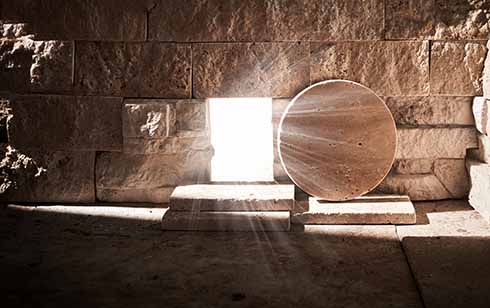 SATURDAY: FROM SILENT NUMBNESS TO HOPE AND JOY
SATURDAY: FROM SILENT NUMBNESS TO HOPE AND JOY
On the first day of the week, at early dawn, the women went to the tomb, taking the spices they had prepared. And they found the stone rolled away from the tomb, but when they went in they did not find the body of the Lord Jesus. While they were perplexed about this, behold, two men stood by them in dazzling apparel. And as they were frightened and bowed their faces to the ground, the men said to them, ‘Why do you seek the living among the dead? He is not here, but has risen!’ Returning from the tomb they told all these things to the eleven and to all the rest.
– Luke 24: 5–6, 9
REFLECTION
Each day this week, I have tried to see beyond the pain of the Lord’s Passion to signs of confidence, trust, acceptance, and hope. I spend some time recalling what I have experienced. And then there was yesterday, Good Friday: the pain and silence surrounding Jesus as he gives up his spirit. So I may well feel numb and empty today. Perhaps like the women, I go routinely about my normal activities. As I read Luke’s text, I imagine these women coming mechanically to tend the body of the Lord where it has been laid. This is all that’s left to do. But where is he? And who are those men in bright clothes? Surely, please, no more bad news? I spend a few moments being in the scene with them.
But then I hear the cry of the men. What happens? How do the women feel . . .? And how do I myself feel? Can it be true? I watch them filled with hope and joy, running to tell the other disciples. Perhaps I go with them. Now the world around me that was grey and bare has come to life.
In what ways can I express my hope and joy? How do I explain to others how I feel? But I also notice all those around me who still feel numb and in pain, for whom hope is still a long way off. I pray for them and entrust them to the risen Lord. I close my prayer with heartfelt Alleluias.
ALLELUIA! ALLELUIA! THE LORD IS RISEN!
I am sure I shall see the Lord’s goodness in the land of the living.
Hope in him, hold firm and take heart. Hope in the Lord!
– Psalm 26 (27) Grail Translation